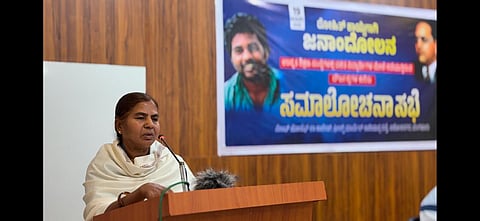

Several Dalit and Adivasi student organisations, along with civil society groups, came together on Sunday, January 19 to demand the enactment of Rohith Act in Karnataka. The proposed legislation, named in memory of University of Hyderabad (UoH) PhD scholar Rohith Vemula who died by suicide in January 2016, aims to address systemic caste discrimination in higher education institutions, prevent institutional violence, and support marginalised students across the country.
The event, organised under the banner of the ‘People’s Movement for Rohith Act,’ brought together prominent voices advocating for justice and reform. Among them were Radhika Vemula, mother of Rohith Vemula; Mavalli Shankar, leader of the Dalit Sangharsha Samiti (Ambedkarvada); and researcher Dontha Prashanth, a close friend of Rohith.
Radhika Vemula remembered her son as a calm, gentle, sharp young man, who she couldn’t imagine would be gone one day. She spoke about how Dalit students are institutionally discriminated against receiving education, and the challenges that Dalit students have to face to overcome these hurdles, to achieve dignity and upward mobility in their lives. “It is because of the anti-Dalit people in Bharatiya Janata Party (BJP) that I’m still being denied justice. I do not want any other mother to go through the pain I went through, and I will keep continuing to fight for justice and to build anti-caste consciousness,” she said.
On January 17, 2016, Rohith died by suicide in the university after facing ostracisation. His death was termed “institutional murder” by activists and students. In his suicide note, which is etched in people’s memories for its powerful words, Rohith wrote, “My birth is my fatal accident.” He spoke of star dust and Carl Sagan, and wrote, “The value of a man was reduced to his immediate identity and nearest possibility.”
Expressing solidarity with Prof Gopal Das of the Indian Institute of Management, Bangalore (IIMB), Radhika acknowledged the professor’s battle against caste discrimination within his institution.
Prof. Gopal Das had filed a complaint of caste-based discrimination against the IIMB director and seven faculty members, leading to an FIR being registered. However, the Karnataka High Court has stayed the investigation into the case.
Dontha Prashanth, a friend of Rohith Vemula and a researcher, recounted their shared experiences of social boycott and humiliation at the University of Hyderabad. “We were termed as ‘goons’, which is a routine form of humiliation used against Dalits across the country and an attack on our self-respect. University spaces systematically create spaces that alienate Dalit and Adivasi students, which is why the Rohith Act is essential to question these caste norms.,” he said.
The call for a Rohith Act stems from a pressing need to address the covert and overt caste practices that plague universities across India. Dalit Sangharsha Samiti leader Mavalli Shankar said, “Casteism is rampant in educational institutions. Government school children are being denied nutritious food cooked by Dalit midday meal workers. If casteism is so rampant in educational spaces, it requires special legislation like the Rohith Act to address these concerns.”
Lekha Adavi of All-India Students’ Association said that the existing legal framework was insufficient to address the covert caste practices and discrimination that occurs in universities. “A legislation must provide a support structure for Dalit and adivasi students and also address caste discrimination,” she said.